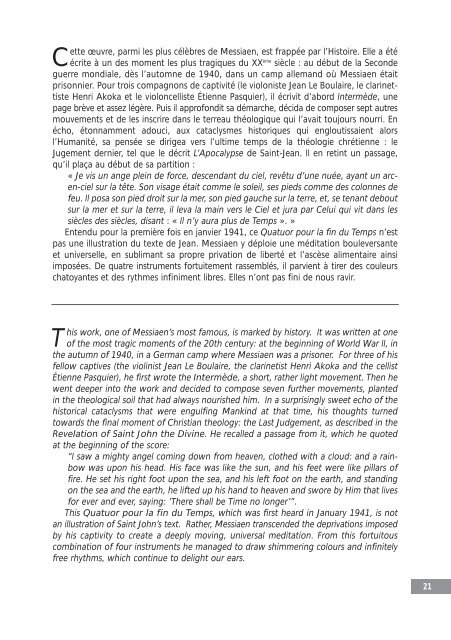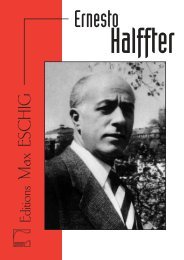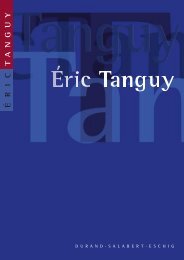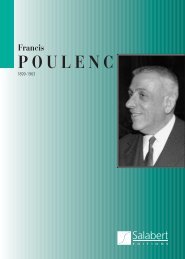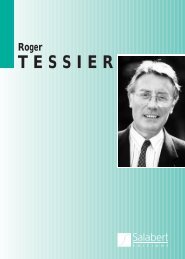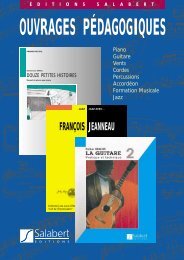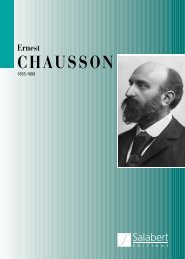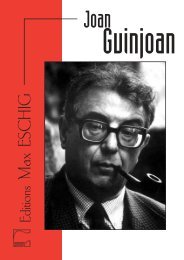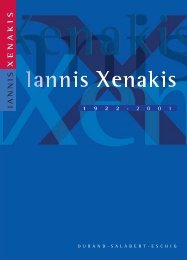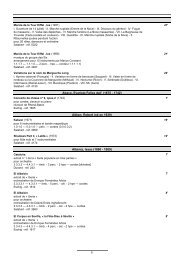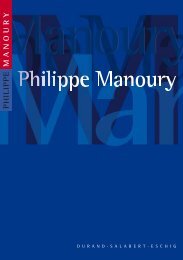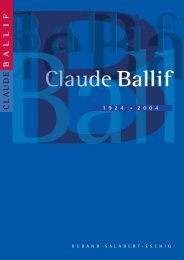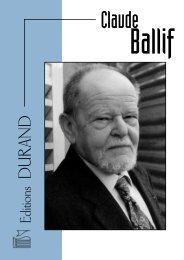messiaen olivier 1 9 0 8 - Durand Salabert Eschig
messiaen olivier 1 9 0 8 - Durand Salabert Eschig
messiaen olivier 1 9 0 8 - Durand Salabert Eschig
Create successful ePaper yourself
Turn your PDF publications into a flip-book with our unique Google optimized e-Paper software.
C ette œuvre, parmi les plus célèbres de Messiaen, est frappée par l’Histoire. Elle a été<br />
écrite à un des moment les plus tragiques du XX ème siècle : au début de la Seconde<br />
guerre mondiale, dès l’automne de 1940, dans un camp allemand où Messiaen était<br />
prisonnier. Pour trois compagnons de captivité (le violoniste Jean Le Boulaire, le clarinettiste<br />
Henri Akoka et le violoncelliste Étienne Pasquier), il écrivit d’abord Intermède, une<br />
page brève et assez légère. Puis il approfondit sa démarche, décida de composer sept autres<br />
mouvements et de les inscrire dans le terreau théologique qui l’avait toujours nourri. En<br />
écho, étonnamment adouci, aux cataclysmes historiques qui engloutissaient alors<br />
l’Humanité, sa pensée se dirigea vers l’ultime temps de la théologie chrétienne : le<br />
Jugement dernier, tel que le décrit L’Apocalypse de Saint-Jean. Il en retint un passage,<br />
qu’il plaça au début de sa partition :<br />
« Je vis un ange plein de force, descendant du ciel, revêtu d’une nuée, ayant un arcen-ciel<br />
sur la tête. Son visage était comme le soleil, ses pieds comme des colonnes de<br />
feu. Il posa son pied droit sur la mer, son pied gauche sur la terre, et, se tenant debout<br />
sur la mer et sur la terre, il leva la main vers le Ciel et jura par Celui qui vit dans les<br />
siècles des siècles, disant : « Il n’y aura plus de Temps ». »<br />
Entendu pour la première fois en janvier 1941, ce Quatuor pour la fin du Temps n’est<br />
pas une illustration du texte de Jean. Messiaen y déploie une méditation bouleversante<br />
et universelle, en sublimant sa propre privation de liberté et l’ascèse alimentaire ainsi<br />
imposées. De quatre instruments fortuitement rassemblés, il parvient à tirer des couleurs<br />
chatoyantes et des rythmes infiniment libres. Elles n’ont pas fini de nous ravir.<br />
This work, one of Messiaen’s most famous, is marked by history. It was written at one<br />
of the most tragic moments of the 20th century: at the beginning of World War II, in<br />
the autumn of 1940, in a German camp where Messiaen was a prisoner. For three of his<br />
fellow captives (the violinist Jean Le Boulaire, the clarinetist Henri Akoka and the cellist<br />
Étienne Pasquier), he first wrote the Intermède, a short, rather light movement. Then he<br />
went deeper into the work and decided to compose seven further movements, planted<br />
in the theological soil that had always nourished him. In a surprisingly sweet echo of the<br />
historical cataclysms that were engulfing Mankind at that time, his thoughts turned<br />
towards the final moment of Christian theology: the Last Judgement, as described in the<br />
Revelation of Saint John the Divine. He recalled a passage from it, which he quoted<br />
at the beginning of the score:<br />
“I saw a mighty angel coming down from heaven, clothed with a cloud: and a rainbow<br />
was upon his head. His face was like the sun, and his feet were like pillars of<br />
fire. He set his right foot upon the sea, and his left foot on the earth, and standing<br />
on the sea and the earth, he lifted up his hand to heaven and swore by Him that lives<br />
for ever and ever, saying: ‘There shall be Time no longer’”.<br />
This Quatuor pour la fin du Temps, which was first heard in January 1941, is not<br />
an illustration of Saint John’s text. Rather, Messiaen transcended the deprivations imposed<br />
by his captivity to create a deeply moving, universal meditation. From this fortuitous<br />
combination of four instruments he managed to draw shimmering colours and infinitely<br />
free rhythms, which continue to delight our ears.<br />
21


